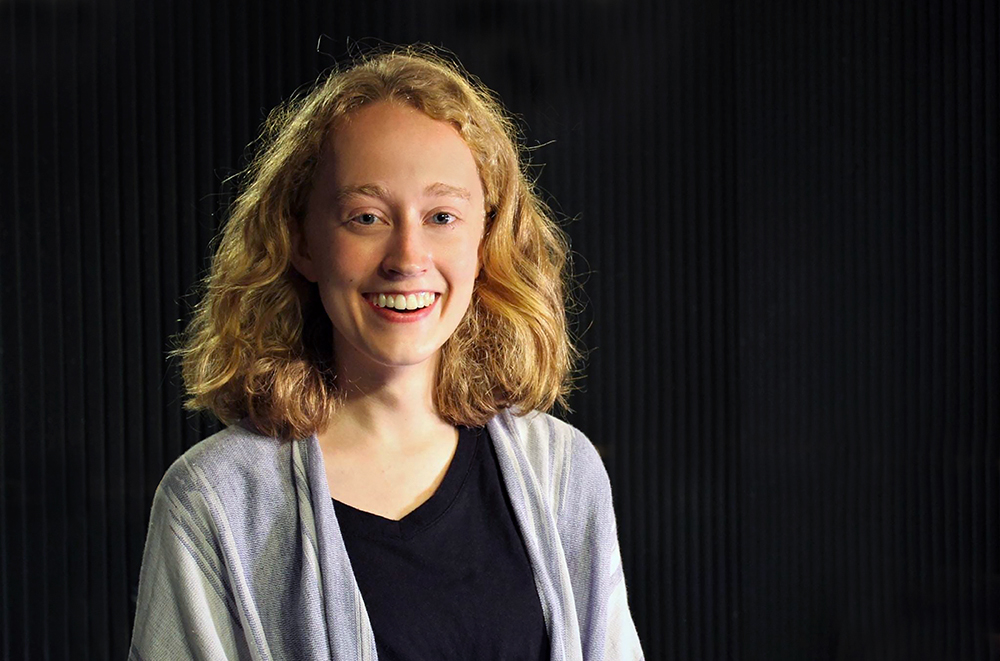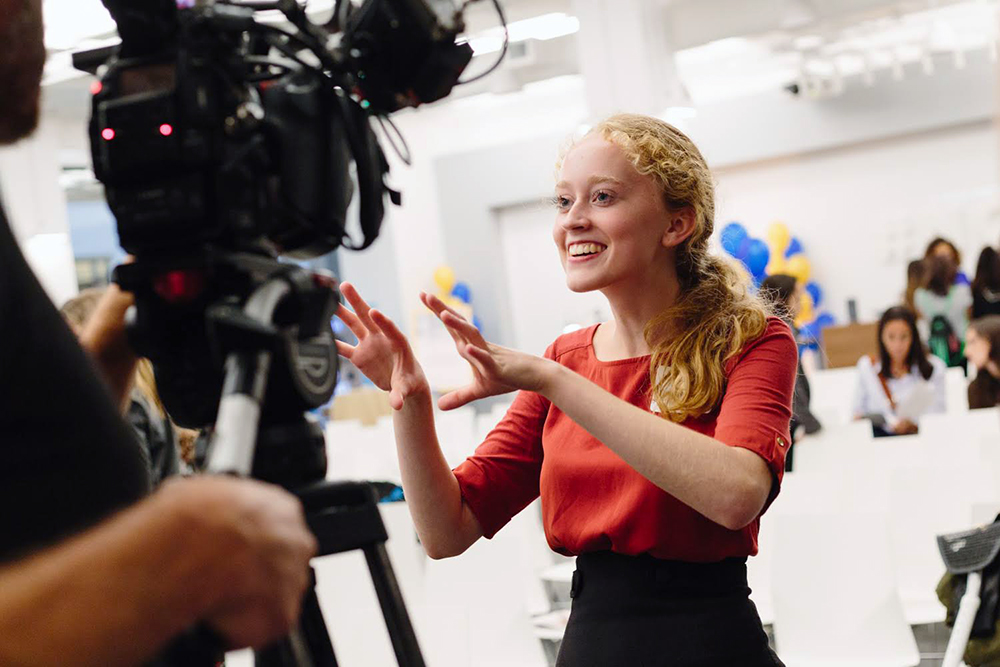
Before her 21st birthday, Lenexa native Erin Smith founded a company that was named the Top Health Startup of 2019 by Wired magazine, won a $100,000 Thiel fellowship from the billionaire founder of PayPal, and was the youngest honoree named to Forbes’ 30 Under 30 list of health care innovators in 2019.
Smith invented FacePrint, an artificial intelligence tool for diagnosing and monitoring Parkinson’s Disease, during her sophomore year at Shawnee Mission West High School. Over spring break she visited Parkinson’s patients and healthy control subjects, capturing video of their spontaneous responses to video clips and their attempts to mirror expressions they were shown. She used the data collected to develop software that could evaluate the facial expressions.
The idea for the technology came from watching the TV detective series Lie to Me, about a scientist who could read quick, tiny facial muscle movements that most people miss, and also from noticing that actor Michael J. Fox, who has Parkinson’s, appeared emotionally distant when he smiled or laughed.
IN Kansas City caught up with Smith by phone from Palo Alto, where she currently lives while studying Symbolic Systems (a program that combines Computer Science and Neuroscience) at Stanford University.
How do you like living in Palo Alto?
I love living in California. It’s super fun to have beaches and mountains. I love building a life here for now.
What do you miss about Kansas City?
I definitely miss barbecue. I’ve been looking all over the Bay Area and I’ve not found barbecue that can compare, so every time I come home, I try to fill up.
I also miss the people. There’s also a very distinctive quality of life, a certain mentality that is really engraved in me that I attribute to being raised in Kansas.
How would you describe that mentality?
I think there is a work ethic, a level of diligence that Kansans exemplify really well, of putting your head down and focusing on what needs to be done and not being distracted by the noise in the world. Separately, I think there’s a very distinctive warm and welcoming, neighborly quality. In Kansas I knew all of my neighbors. When you are at a grocery store, you smile and talk with strangers. That is a different mentality than in California, a cultural difference. I do love, love, love the people I’ve met in California, but there is a distinctive way people interact with neighbors and with strangers that I miss.
What were your parents like? What do you think you got from them that put you on this very successful path at such a young age?
I was raised by my mom. She doesn’t have a formal scientific background. She always took the time to find hands-on ways to answer my questions about the world by doing experiments. We went to the library every week to find books that could answer my questions. She embraced creativity as a form of education. When I was little, my mom and I turned one corner of our kitchen into a little makeshift laboratory. I would spend hours there tucked away doing experiments.
What kind of experiments?
Some that I remember the most were exploring the chemical reactions of common kitchen ingredients, like making rock candy by crystallizing sugar. You could observe every day how the shapes changed, and you could do different things to make different shapes.
I also really loved rocks, and I had a large rock collection and I learned about geology and properties of rocks by reading about them and classifying them. It was any and everything I was interested in. I felt like I had complete intellectual freedom and complete creative freedom as well.
What does your mom do for a living?
She is an accountant and financial advisor. I also got a really good financial literacy education as well. When I was really, really young, we would all help my mom come up with a real family budget using Monopoly money.
How many siblings do you have?
I’m one of five. I have two older sisters and two younger brothers.
In developing FacePrint, you’ve been immersed in three fields: science, entrepreneurship, and computer technology. Is there one of those fields where you are working more at the cutting edge than the others?
I feel like the cutting edge comes at the confluence of all these fields. I think FacePrint has been able to have this rapid acceleration because it is working with some of the latest advances and problems in neuroscience and clinical sciences and combining that with robust computer technology involving machine learning and computer vision algorithms. And commercialization and entrepreneurship play an important role in this health ecosystem, so I’m trying to integrate that.
In one interview you said you’ve gained a lot of insights into medical delivery systems. What are some of your observations?
We are seeing a shift in how healthcare is delivered. You can characterize the shift by two overarching changes. The first is that it is becoming extremely consumer-centered. I’m really optimistic about this change. I think it’s going to enable people to become much more equipped with the education and tools they need to become better self-advocates. I hope that leads to a more proactive and less reactive form of health care.
The second large observation I’ve been thinking about is the shift towards telemedicine. I think Covid has accelerated these changes that were already unfolding. It has forced us to radically reimagine how care is going to be delivered.
“I think the doctor-patient relationship is really, really important, and I don’t think technology will ever replace that. I think technology can provide support tools for clinicians and enable them to prioritize things that they are uniquely equipped to do.”
Do you worry that telemedicine could weaken the doctor-patient relationship?
I think the doctor-patient relationship is really, really important, and I don’t think technology will ever replace that. I think technology can provide support tools for clinicians and enable them to prioritize things that they are uniquely equipped to do.
I think telemedicine has opened a window of opportunity for doctors to capture what people’s real everyday health looks like, bridging the intervals between visits. That’s something I’m really excited about.
Do you spend time thinking about ethical frontiers and controls that can be put in place to prevent FacePrint from being used nefariously, or do you feel that is outside your control?
Since the infancy stages of FacePrint, that is something I think a lot about and am concerned about. As the months and years go on, and I see examples at the global level, these ethical and social questions become more important to me.
While there is so much potential for these technologies to be used for good, I think for their potential to be fully realized we have to be continuously grounding ourselves in the reality of potential unethical applications and also side effects, such as algorithmic bias. There’s been a ton of interesting work in the past five to seven years that has exposed that the way we are teaching computers how to learn is perpetuating some systemic biases.
I think it is critical that technologists have a very strong ethics background, so since I started at Stanford, I’ve been taking a ton of philosophy and ethics classes to give me the mental framework that I need.
As you gain insights into Parkinson’s disease by analyzing facial reactions, have you discovered other uses for that technology?
There have been a lot of exciting applications emerging. I’m in close contact with researchers who are looking at stroke and autism using facial expression differences.
Another exciting area is the development of artificial emotional intelligence, or creating computers that are able to understand human emotion, largely through facial expression, body language, and voice. The voice communicates a lot of emotional information.

Has it been hard adjusting to your growing celebrity within your field?
It has been a challenge to navigate because it was very, very unexpected. It was pretty crazy. Every year in school, I did a research project. It was sophomore year that I got the idea for FacePrint, and everything just clicked into place. I’m so grateful and I’ve learned so much on this journey.
Besides the direct things I learned working on FacePrint in high school, it opened up opportunities to travel. I learned so much by visiting countries with rich, vibrant cultures and history, and beautiful scenery. I got to go to China to attend their national science fair, and I was invited to Switzerland to meet with students from around the world to imagine the future of cities.
At age 16, FacePrint thrust you into sudden adulthood. Do you ever feel like you missed out on unstructured, carefree goofing-off time?
I do think about finding a work-life balance and finding ways to recharge and prioritize health and well-being. Friends and family are important because they give me confidence, but they also help me not take myself too seriously in terms of not tying too much of my personal identity to outcomes like whether or not FacePrint reaches certain milestones.
What do you do to relax?
I love going on long runs and doing yoga. I also love making bread, that’s something I started doing when I was young that has stayed with me. I also love sitting down with friends and having long catch-up conversations.
How does it feel knowing there is a good chance you could become very, very rich before you are 30? How would you like to live if that happens?
I decided from a young age that I will optimize my time in life around learning. Working on meaningful global problems is where I derive the most value and fulfillment. Maybe this will bring lots of wealth and maybe it will not. If it does, I hope to maintain my frugality—my splurging comes from occasionally buying really high-quality dark chocolate.
A mentor once told me that people always ask successful women if they want to donate, but not if they want to invest. This is problematic to society and women. Instead, I hope to do both. I hope to use whatever wealth I accumulate to make meaningful business investments and philanthropic donations.
Interview condensed and minimally edited for clarity.

